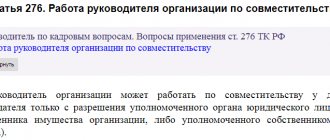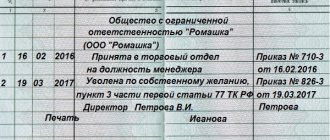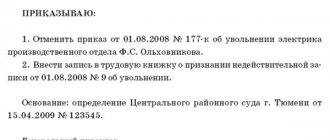Article 280 of the Labor Code is devoted to the situation of early termination of an employment contract on the initiative of the head of the organization.
It establishes the timing of notification of this event. Labor Code of the Russian Federation
dated December 30, 2001 N 197-FZ
Full text of the article, guides, additional information - in ConsultantPlus
What may be the grounds for dismissal at the initiative of an employee under the Labor Code of the Russian Federation?
Important! Please keep in mind that:
- Each case is unique and individual.
- A thorough study of the issue does not always guarantee a positive outcome. It depends on many factors.
To get the most detailed advice on your issue, you just need to choose any of the options offered:
- Use the online chat in the lower corner of the screen.
- Call: Federal number: +7 (800) 511-86-74
The main norm of the Labor Code of the Russian Federation for an employee seeking to change or leave his place of work is considered to be Art. 80 Labor Code of the Russian Federation. According to her, no employer can refuse to dismiss his employee, of which he was notified in writing at least two weeks in advance. At the same time, a person has the right not to specify the reason for his departure and not to agree to a longer period of work. Only those who have decided to shorten or completely avoid the warning period about the upcoming settlement should inform the employer about the details of the current life circumstances.
Special norms of the Labor Code regulating the procedure for dismissal at the initiative of an employee relate to particulars:
- extended period of service for managers, Art. 280 Labor Code of the Russian Federation;
- deferment of dismissal until the end of the vacation, art. 127 Labor Code of the Russian Federation;
- opportunities to change your mind, Art. 64 Labor Code of the Russian Federation.
Conventionally, the employee’s desire can also be called the option of terminating the employment contract by agreement with the employer, Art. 78 Labor Code of the Russian Federation.
Advantages
An employment contract with an indefinite duration has significant advantages for the job seeker:
- the ability to confidently plan your expenses, having a constant income in the form of a stable salary and a position included in the staffing table,
- a complicated procedure for dismissing an employee at the initiative of the employer,
- Permanent employees can receive additional bonuses from the employer in the form of a voluntary health insurance policy, bonuses, and participation in social programs.
We invite you to read: Agreement on cooperation and third parties
The most important points specified in the relevant agreement include:
- labor function,
- position according to the staffing table,
- terms of reference, duties and rights of the parties,
- employee remuneration, possible incentive or compensation payments.
In addition to the main aspects of future work, the employment contract may include additional clauses on continuous improvement of skills, payment for the relocation of the employee to the place where work duties are performed, payment for travel from the place of work to home, and others.
An employment agreement with no time limit has a list of advantages over a fixed-term contract:
- Both parties are exposed to fewer risks.
- An open-ended agreement provides stability and confidence in the future.
- Work on the basis of such an agreement helps improve the economic climate in the state.
Reasons for voluntary dismissal
The law does not prohibit the manager from asking the employee the reasons that prompted him to write a statement of his own free will. But at the same time, if the person himself does not agree to disclose them, the employer cannot insist or put forward additional conditions. Every working specialist must understand that, on his personal initiative, an employment contract of any type can be terminated: fixed-term, open-ended, seasonal, or while replacing an absent employee. Moreover, you can write a resignation letter at the employee’s initiative even the next day after signing the employment contract.
An employee who has given two weeks' notice of dismissal is not required to explain the reason or give additional explanations regarding his resignation.
On a sick leave
The general procedure for dismissal at the initiative of an employee involves advance notification of management of his intentions. But during the 14 days allotted for this, many events can happen that can affect the timing and dates, and sometimes even the desire to leave. In particular, often during the working period the employee who wrote the application goes on sick leave. If the period of incapacity for work ends quite quickly, then the HR department does not have problems with dismissal and transfer of documents. More difficulties are associated with the fact that the employee does not recover by the scheduled payment date.
The firm conviction that dismissal during vacation or sick leave is prohibited makes the personnel officer think about the correctness of his own actions. In fact, it is impossible to terminate an employment relationship with an unhealthy employee solely on the basis of the employer’s wishes, Art. 81 Labor Code of the Russian Federation. If the desire to pay off arises from the employee himself, then formalize the dismissal of the employee on the basis of Art. 80 of the Labor Code of the Russian Federation is necessary within the planned or specified time frame. At the same time, the employer remains obligated to pay him for his sick time, pay the required paychecks and hand over his work the next day after recovery.
For health
If an employee’s incapacity for work becomes systematic and prevents him from working fully, then he may refuse to continue working so as not to wear out his already deteriorating health. You need to understand that we are not talking about establishing disability or inadmissibility to work for medical reasons, because then the contract will be terminated for reasons beyond the control of the parties, Art. 83 Labor Code of the Russian Federation.
For those who do not feel the strength to continue their work in their current position, there is a legal basis not only to pay off at the employee’s initiative, but also to dismiss the employee on the same day. The same article allows you to leave quickly. 80 of the Labor Code of the Russian Federation, which states that a valid reason for refusing to work is considered to be the inability to no longer perform one’s labor functions.
The right to assess the seriousness and validity of the grounds listed by the employee is reserved to the employer.
By early dismissal
When a native enterprise begins to experience economic or organizational difficulties, it often sacrifices part of the team and announces a reduction in personnel or staff. It is difficult to imagine that most of them really wanted to look for a new job, but even in this case there is an opportunity to convey their own will to management.
Art. 180 of the Labor Code of the Russian Federation states that a specialist warned about layoffs has the right to early dismissal with the remainder of his salary, severance pay and other payments that would have been due to him had he left on the day specified in the notice. It is impossible to call this form of separation the employee’s desire, if only because the presence of such wording in the application will deprive the person of all preferences at the labor exchange and the right to benefits. But his superiors have no reason to formalize early dismissal without the consent of the hired person.
For those who decided to take advantage of the administration’s offer and the provisions of Art. 180 of the Labor Code, you need to remember that in the application you need to write only about the desire to pay before the date of reduction. It is also safer not to forget to add that the dismissal must be carried out according to paragraph 2 of Art. 81 of the Labor Code, and on the day of dismissal the person intends to receive all benefits and compensation.
Procedure for registering dismissal
In a simplified form, the rules and procedure for terminating an employment relationship at the initiative of an employee are disclosed in Art. 84.1 Labor Code of the Russian Federation. Particular nuances of the procedure depend on specific circumstances and grounds.
Statement
The process will be given impetus by the employee’s statement about his desire to leave his workplace. There are several points that must be adhered to in order for the dismissal to take place within the desired time frame and under acceptable conditions:
| Stages of writing a document | Recommendations |
| The application must be written in person in two copies. | When transferring a document to the office, it is better to ensure that it is received and registered in incoming correspondence. |
| All dates and signatures must correspond to the day the document was submitted | The employer’s request not to put a date or to write a letter of resignation without a date is a direct indication of subsequent dishonest actions and manipulations. If the decision to resign comes from the employee, then the application must be drawn up at the current moment, indicating all the necessary details |
| If the employee does not ask to reduce the working time, then the reason may not be indicated. | Refusal to accept an application due to the fact that it does not indicate the reason for leaving is arbitrary and a way to delay time. |
| If an employee wants to make a payment earlier, then supporting documents must be attached to the application. | When the need to resign is dictated, for example, by a move in connection with the transfer of a spouse to a new place of duty, then this must not only be mentioned in the document, but also it must be added that a copy of the order on the change of place of work of the husband/wife will be attached to it |
| The grounds for dismissal can be changed at the employer's suggestion, but only if it suits the employee | If, in the process of discussing the conditions for terminating an employment contract, a decision is made to change “own desire” to “agreement of the parties,” then you need to remember that it is no longer possible to withdraw such a statement. |
Very often, hired workers do not fully understand all the consequences and the seriousness of the application for payment they have written. Meanwhile, it is this paper that will become the basis not only for the dismissal order, but also an argument for the commission on ore disputes or in court. That is why, when drawing up a document, it is necessary to write only what the employee actually wants, and not what the dissatisfied boss advised him, promising “to solve everything later.”
Order
The employer can issue a dismissal order at the employee’s initiative either on the day the application is received, indicating the planned date of termination of the employment relationship, or on the last day of work. The main condition is to familiarize the employee with this document against signature no later than the last day of work.
An order can be drawn up based on the unified T-8 form, or it can be done arbitrarily, since the use of these forms is no longer mandatory. The content of the document, in addition to the employee’s personal data, indicates:
- grounds for dismissal;
- date of contract termination;
- norm of the Labor Code of the Russian Federation;
- a list of documents supporting the decision made.
Fully completed fields of the director’s order will become the basis for making an entry in the work book.
Working off
Not the last issue when dismissing an employee at his own request is the problem of working off. By law, it cannot exceed 14 days, but often the employer tries to impose his point of view and mentions the need to find a new employee, transfer affairs to him and train the newcomer. All these problems concern only the employer. The former employee can take them into account only during the last 14 days, counting from the next day after submitting the resignation letter, even if the next day is a day off.
It happens that a two-week notice can cause a lot of discomfort for an employee. After all, dismissal is often associated with objective reasons for the inability to remain in the team. Article 80 of the Labor Code of the Russian Federation provides for only two unconditional cases that exempt you from working off:
- the need to start studying;
- transition to retirement.
Mentioning other cases in this regard leaves room for creativity and competition. After all, in order for the employer to agree to let a specialist go on a shortened notice, the latter needs to try and convince management of the exclusivity of his own position. Those who can provide documentary evidence of what was said have the best chance.
Theoretically, you can try to defend the right to refuse work in the labor inspectorate or court. But in practice these actions are meaningless. The duration of consideration of the complaint will almost certainly exceed 14 days, and until a decision is made on the illegality of the employer’s actions, it is impossible to calmly leave the workplace. The result of such arbitrariness may be an unpleasant entry on the pages of the labor report about dismissal for absence from work without the consent of the administration, paragraphs. a) clause 6 of Art. 81 TK.
The standard duration of service upon dismissal at the initiative of an ordinary employee is no more than 14 days, Art. 80 TK
Entry in the work book
Despite the fact that data on the length of service of insured persons has long been accumulated in electronic databases, the work book still retains the status of a particularly important document. This is both a chronicle of working life and a kind of recommendation when applying for a new job. This point of view is also confirmed by the norm regarding the duration of storage of labor records in the archives of the enterprise (75 years from the date of dismissal), unless it is requested by the employee himself or his relatives.
After signing the payment order, a copy of it is handed over to the personnel officers, who are obliged, no later than the last day of work, if the employee was on duty that day, to hand over the book to the owner against signature in the labor movement register. By this point, it should contain a note stating that the working relationship was terminated based on the personal desire of the employee, clause 3 of Art. 77 of the Labor Code of the Russian Federation, and also recorded the data of the order for the enterprise.
The nuances of an open-ended employment contract
- This type of agreement is concluded for an unspecified period, that is, it is not terminated after a certain period of time due to its expiration and is valid until one of the parties decides to terminate the agreement in the manner prescribed by law.
- Termination of the agreement occurs either at the will of the employer based on the reasons listed in the Labor Code, or at the request of the employee, but within the time limits established by labor legislation.
- The contract must indicate the exact date from which the employee begins to perform his job duties. The absence of a start date for an employee’s work in an organization may be a justification for absenteeism, since the first working day is not determined in accordance with the procedure established by law.
- The number and duration of paid vacations, the number of rest breaks that an employee is allowed to take during the working day, the duration of one shift and working week, and the period of time during which the employee is required to be present at his workplace must be indicated.
- Many employers provide a probationary period for new employees. This is the period during which the employee must show that he was able to work well with the rest of the organization’s team, does his job conscientiously, and his level of qualifications corresponds to the position he holds. The probationary period must be clearly stated in the employment agreement, and it cannot exceed a three-month period. An exception is the positions of managers, for which it is possible to assign a probationary period of up to 6 months. If information about the probationary period is not in the agreement, this means that the employee is initially recognized as fit for work and is accepted for work without a testing period.
- If the employment contract is found to be missing any important information that is mandatory under current law, then there is no reason to terminate the old agreement and re-enter a new one. It is enough to draw up an annex to the agreement, which will also be signed by all parties and can have the same legal force as the main document.
Payment and compensation
The director’s order will become a guide to action not only for the personnel department, but also for the accounting department. By the last work shift the following must be accrued and paid:
- the balance of the salary and its arrears;
- compensation for all days of rest that the departing person did not have time to use;
- severance pay or bonuses for length of service, if something similar is provided for in the collective agreement.
All funds must be paid within the limits of amounts not disputed by the parties. If, after the date of dismissal, the employee still has financial claims against the former employer, then he has the right to independently calculate them and apply to the court to restore the truth within a year, Art. 392 Labor Code of the Russian Federation.







